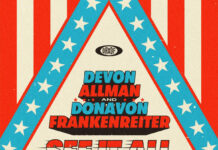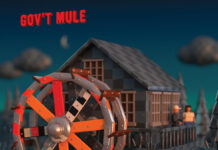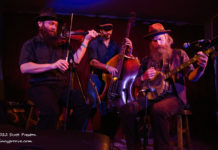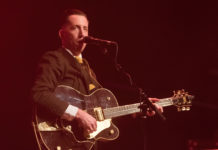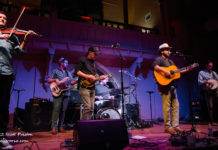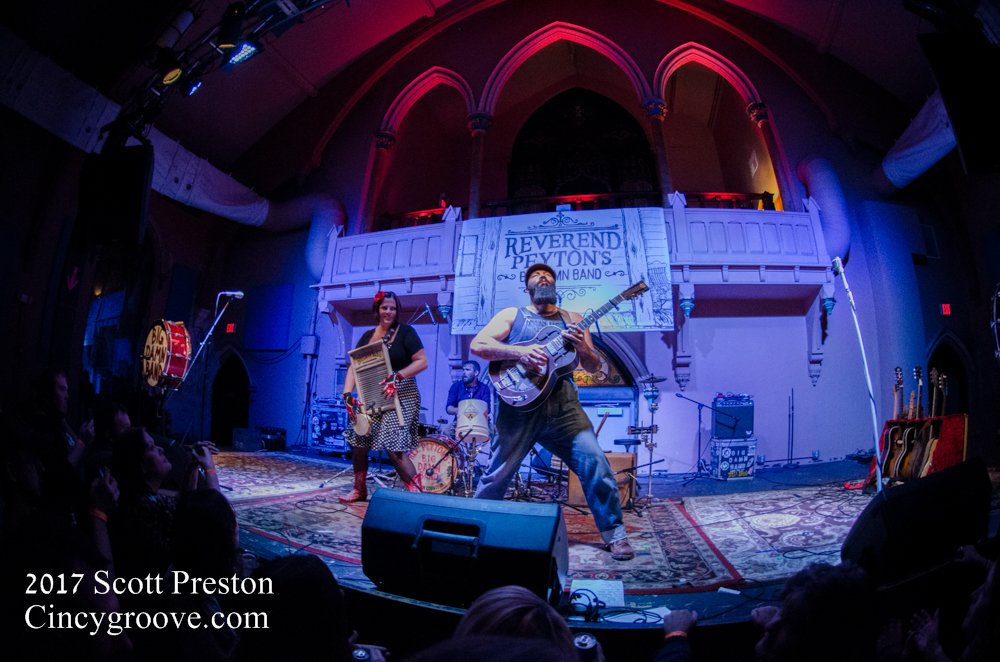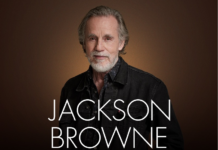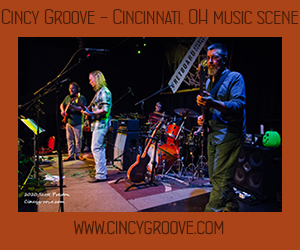
Photo by Scott Preston
Few studio albums have had a birth process like Jimbo Mathus’ new release,Dark Night of the Soul, due out February 15, 2014. To create his ninth album, the singer-songwriter spent nearly a year going to Dial Back Sound Studio, near his home in Taylor, Mississippi, to work on new tunes. Dial Back Sound, however, isn’t just any conveniently located studio, but one operated by Fat Possum Records’ Bruce Watson, who offered Mathus this extended opportunity to create the follow-up to his highly-regarded Fat Possum debut White Buffalo.
Like having a regular gig at a neighborhood bar, Mathus would drop by the studio every couple of weeks and hash out song ideas with engineer/instrumentalist Bronson Tew. Mathus ended up with around 40 songs and Watson heard them all. “He acted as my editor,” Mathus explains. “I really trust him. He would come in and say, ‘I like this or could we change a little of that?’”
Mathus enjoyed the casual, low-pressure studio environment but also felt challenged to bring new material to the table every week. “I would pull out scraps of paper from my wallet that normally I would dump in the trash and those would be the ones that Bruce liked.” The ones Watson would gravitate to be the darker songs — the ones, Mathus confides, he would typically keep private. “So collaboratively,” he says, “we brought them to life.” This process resulted in his most personal and hardest rocking album to date. While on earlier releases, the Mississippi-bred Mathus tended to showcase his encyclopedic facility with Southern roots music, this time, however, he really wanted to play his songs unselfconsciously — “letting them just fall off the bone.”
This emphasis on “more ultra chrome and less sepia tones,” as Mathus calls it, arrives on the title track that opens the album. Fiery electric guitars match the artist’s emotionally wrenching vocals as he pleads to be taken to his “sweet solution.” A similar search for salvation fuels the impassioned soul-rocker “White Angel,” while a more rollicking spirit imbues the ’70s Southern rock-flavored “Rock and Roll,” where the piano is pounded as hard as the guitars. “Shine Like a Diamond,” a love ode to Mathus’ wife Jennifer, sparkles like an old Van Morrison-style gem, complete with some “sha-la-la” near the end.
Dark Night grows funkier in its second half with tracks like “Fire in the Canebrake” and “Casey Caught the Cannonball.” Mathus’ take on the Casey Jones legend (which he wrote from facts he got off of a roadside marker) conjures up memories of The Band, as does another Dixie-based tale, “Hawkeye Jordan.” The album ends in a rather dark place with the closing tracks: the junkie lament “Medicine” and eerie eulogy “Butcher Bird.”
On most of Dark Night’s tracks, Mathus’ acoustic guitar is surrounded by the electric guitar played by his longtime sideman Matt Pierce and pal Eric “Roscoe” Ambel. (Ambel produced White Buffalobut on Dark Night he focuses exclusively on his righteous guitar playing.) The album’s raw, rock sound arose from the fact that most of the tracks were recorded live in the studio with Mathus’ band, the Tri-State Coalition, which he found “very liberating way of doing it.” Mathus feels very in synch with his bandmates (keyboardist Eric Carlton, drummer Ryan Rogers, guitarist Pierce and guest bassist and Drive By Trucker Matt Patton) since they have played together now for several years. “The intensity you’re hearing on this album,” he proclaims, “is the spirit of a band that is putting its shit on the line.”
As potent as the band’s recordings are, the album also contains several tracks — including “Casey,” “Medicine” and the swampy blues number “Tallahatchie” — that were actually studio demos. Watson, Mathus explains, didn’t find anything to change in them. It’s this level of trust between the two men that has brought forth and formed the heart of Dark Night. In Mathus’ words, Bruce is “someone who sees what I am capable of doing and wants other people to hear it too. The record is a testament of his vision of me — and an accurate depiction of the way I experience life with its high ups and its far downs.”
While Mathus plays less of the musical historian role on his new album, his love and knowledge of roots music still radiates throughout his songs. “Knowing about some banjo part on a Gus Cannon record informs me on writing a song like ‘Dark Night of the Soul,’ believe it or not,” Mathus reveals. “It’s all in my frame of reference and my musical DNA.”
This musical DNA has been in him since birth. His father and relatives were all skilled musicians who filled the house with old folk, country and blues tunes. By the age of eight, Mathus was joining them on mandolin and by his teenage years had learned guitar and piano. High school led to playing in punk and new wave bands, the most notable being Johnny Vomit and the Dry Heaves and The End, with future Oblivian Jack Yarber. Post high school, Mathus studied Philosophy at Mississippi State University before leaving to travel around America. In doing so he worked various jobs, including an influential stint as a barge tankerman on the mighty Mississippi River. Settling in Chapel Hill, N.C., he drummed in the cult rock band Metal Flake Mother prior to starting the Squirrel Nut Zippers. This ahead-of-its-time retro roots band scored a hit with “Hot” and performed at President Clinton’s second Inauguration and the 1996 Summer Olympics. Following the Zippers’ split, Mathus worked with such noted artists such as Buddy Guy and Elvis Costello, and collaborated with North Mississippi Allstars guitarist Luther Dickinson and Alvin Youngblood Hart in the South Memphis String Band. He also recorded his own albums (including one dedicated to his childhood nanny Rosetta Patton, the daughter of Delta blues icon Charley Patton).
With the South being so central to his life, it’s no surprise that Mathus and his band are very popular there. “I could stay in Mississippi, Alabama and Louisiana and never have to leave,” he admits, “but the point is I want people to hear this album — to bring a little gris-gris to the rest of America.”


